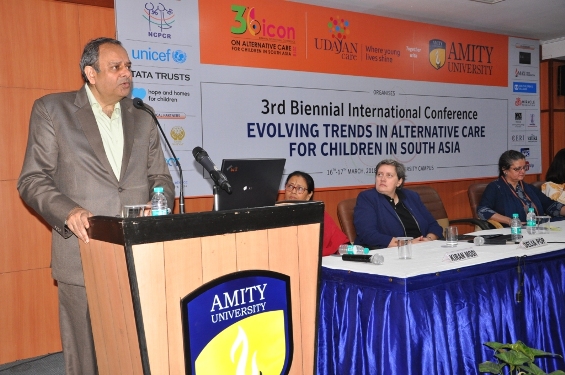16 Mar 2018|Noida | F1 Seminar Hall
3rd Biennial International Conference at Amity University

Todeliberate upon existing standards, legislative and policy frameworks onalternative care in South Asia, ‘Udayan Care’ together with Amity Universityand in partnership with UNICEF started 3rd Biennial International Conference(3rd bicon) on “Evolving Trends in Alternative Care for children in South Asia”at University campus, Sector 125 Noida.
Theaim of the two day Conference is to bring together National and Internationalexperts, individuals and organizations working on child protection andalternative care along with civil society representatives from South AsiaCountries to identify challenges for improving the understanding on alternativecare settings in South Asia.
Welcomingthe gathering, Dr. Kiran Modi, Managing Trustee, Udayan Care said thatsuch conferences provide a platform to deliberate upon standards of care andmental health issues of children in alternative modes of care. She mentionedthat deinstitutionalization, family strengthening ad alternative care arediscourses that have gained International attention in recent years. Shestressed that it is important to address the policies, practices and gaps tostrengthen families from disintegrating and also to create an effectivegatekeeping mechanisms to prevent unnecessary entry into Alternative Care andat the same time, improving mechanisms and quality of life of children who doneed Alternative care to grow as wholesome individuals. Dr. Modi remarkedthat Child and Youth care cannot be stereotyped as ‘one size fits all’ butshould be dynamic and individualized as per the needs, culture and context ofthe child and youth.
Addressingthe gathering, Dr. Delia Pop, Director of Programmes and Global Advocacy,Hope and Homes for Children, UK said that when a family doesn’t havesustainable income or lack certain resources to support the child, thesystematic intervention takes place but only when the situation reaches crisispoint and as a result, the child has to be separated from the family and placedin alternative care home for wellbeing and proper development. She highlightedthat rather than addressing the system of intervention, it is required toaddress the root cause of the problem. She pointed out that timelyidentification of family at risks and providing them with adequate support isrequired. Dr. Pop further added that there is also a need to develop a systemto provide high quality alternative care in those cases where separation isnecessary. She apprised that gatekeeping is the glue that connects theintervention and family strengthening program with the alternative care andfollowing right process of gatekeeping will lead to less children atalternative care and more children getting required care at their homes..
Emphasizingon four critical areas that needs to be worked upon for enabling conditions ofchange she mentioned that political will should be there towards the cause,establishment of know-how’s in countries that require change, collaborationwith civil society and lastly, availability and utilization of financialresources.
Mr.Rakesh Srivastava, Secretary, Women and Child Development, Government of India saidthat in India, foster care has not been very popular and the process ofadoption guided by Juvenile Justice Act requires certain amendments. Heapprised that as per a survey, there are 6871 child care institutions in Indiabut there are many child care institutions who claim to be hospitals and havenot yet registered under Juvenile Justice Act. Initiatives are being taken toget such institutions registered and then the total number of child careinstitutions will be increased to around 9000. He raised concern over theadoptions which have not progressed the way they were has beenanticipated. He shared that the list of expected adoptive parents are14000 but the number of children for adoption are just 900. Mr. Srivastavashared that that ministry has proposed to relieve family court from administrativejob for adoption and to shift the responsibility to District collectors andDistrict Magistrates to expedite the process of adoption. More than 13 milliondistress calls are received and within one hour action is taken to provide aprotection and rehabilitation facility to the child.
Dr.Yasmin Ali Haque, Country Representative, UNICEF India and Ms. Shireen Vakil,Head-Policy & Advocacy, TATA Trust graced the InauguralFunction.
Theconference has witnessed the participation of delegates from various countriesincluding Uk, USA, Zambia, Switzerland, Australia, bankok, Germany,Netherlansds, Nepal, Nepal, Sri lanka and Bangladesh amongst others who willdeliberate upon related topics including ‘Non-institutional care in emergencyand conflict situations in South Asia’, ‘Family strengthening, sponsorship& gatekeeping in South Asia’, ‘Standards of care in foster care, groupfoster care, aftercare & child care institutions in South Asia’,‘Deinstitutionalization Strategy and implications for South Asia’, ‘Bringingtogether diverse experiences and sharing of journeys of adoption, foster careand aftercare’ etc.